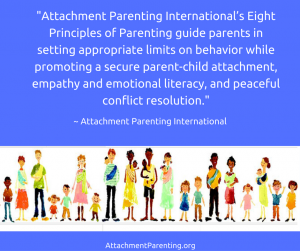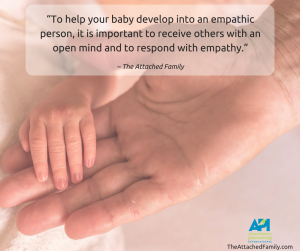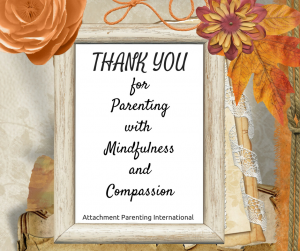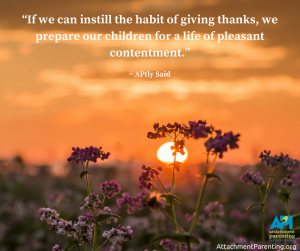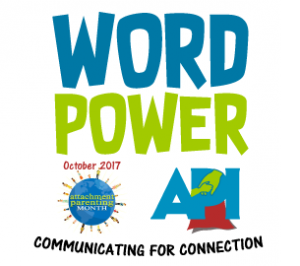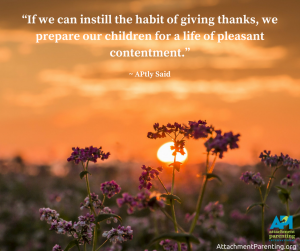Category: General Interest
What are API’s Eight Principles of Parenting all about?
An Open Letter to New Mamas
Dear New Mamas,
With so much unsolicited parenting advice in our information era, I encourage you to raise a red flag to advice including any of the following 6 terms:
There is no “should” with babies especially regarding breastfeeding, safe cosleeping, and milestones. Ignore anyone telling you what your baby “should” or “should not” be doing, based on age of baby. The easiest way to avoid these types of conversations is to not discuss the topics of lactation, sleep, milestones, and nutrition with family members, friends, and coworkers who may not be aligned with your gentle parenting style. Once you find your groove, a simple response of, “This works great for us,” will hopefully pacify the naysayers.
There are lots of varying parenting styles, and it’s less stressful to not compare your baby with others of similar age and to not discuss those topics listed above openly.
“Habit”
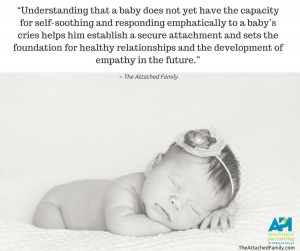 Babies change so frequently that there is not enough time in one consistent state of development for habits to form. If your instinct is telling you to soothe baby in a certain way or to create a safe sleeping environment, you are not forming “bad habits.”
Babies change so frequently that there is not enough time in one consistent state of development for habits to form. If your instinct is telling you to soothe baby in a certain way or to create a safe sleeping environment, you are not forming “bad habits.”
“It works.”
You may come across defensive loved ones advising, “It worked for you,” or well-intentioned friends saying, “It worked for us.” But at what cost? Do your research. For example, the only reason sleep-training “works” is because a baby doesn’t think anyone will come get baby. As another example, putting rice cereal in a bottle adds no nutritional benefits and actually reduces the nutrition baby would otherwise receive from the breastmilk that the rice cereal displaces.
“That’s what the doctor advised.”
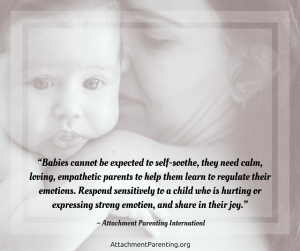 Pediatricians receive minimal lactation and nutrition education. Lactation advice should only be taken from a lactation specialist, preferably with the credentials of IBCLC (International Board Certified Lactation Consultant). Many insurance companies cover their costs. Important to note, only 40% of US women successfully breastfeed after 4 months postpartum and only 20% after 6 months postpartum. If those statistics are that low, yet most infants see a pediatrician, one could assume pediatric advice is not aiding in successful breastfeeding rates.
Pediatricians receive minimal lactation and nutrition education. Lactation advice should only be taken from a lactation specialist, preferably with the credentials of IBCLC (International Board Certified Lactation Consultant). Many insurance companies cover their costs. Important to note, only 40% of US women successfully breastfeed after 4 months postpartum and only 20% after 6 months postpartum. If those statistics are that low, yet most infants see a pediatrician, one could assume pediatric advice is not aiding in successful breastfeeding rates.
Children’s nutrition guidelines and recommendations change frequently and can be skewed by corporate sponsorship. Read labels, and get up-to-date about children’s’ nutrition information. Consider baby-led weaning once baby is starting solids as early as 6 months. MDs are not to be considered experts on parenting style advice. Various methods for baby sleep and nutrition fall under parenting styles and do not require a medical professional’s input.
“Spoiling”
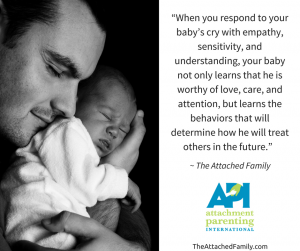 You cannot spoil a baby. Creating a relationship of trust and responsiveness is your role as a mother. Terms like babywearing and Attachment Parenting do not mean you are “spoiling” your baby, but rather creating a safe and secure foundation to set up baby to be an emotionally thriving child adult.
You cannot spoil a baby. Creating a relationship of trust and responsiveness is your role as a mother. Terms like babywearing and Attachment Parenting do not mean you are “spoiling” your baby, but rather creating a safe and secure foundation to set up baby to be an emotionally thriving child adult.
“Good baby”
You will quickly learn the term, “good baby,” is redundant. All babies are good. Unfortunately, Western society associates a “good baby” with one who requires the least amount of caregiver attention. Instead of asking if a baby is “good” when striking up conversation, it’d be more appropriate to ask “What makes baby happy?” And when someone asks if your baby is “good,” try responding with, “We’re having fun.”
Sincerely,
A fellow mom, meandering her own peaceful parenting journey, by surrounding herself with those who get it
Happy Thanksgiving!
A habit of thanksgiving
AP Month 2017 is here — Let’s celebrate “Word Power”
“Sticks and stones may break my bones, but words will never hurt me.” Regardless of this old adage, words have been used to initiate great harm across history and into our present day.
As parents, we’re in a unique position to help our generation of children learn to not only “use your words” but use words designed to harness the power of deep connection, understanding, healing, and good.
This month, October 1-31, Attachment Parenting International‘s 2017 Attachment Parenting (AP) Month theme centers around the reality that our words are powerful and most beneficial when we seek and use them to connect.
Words fly around us in every medium imaginable and even visual media is translated into verbal and/or written expression. We swim in a great alphabet soup. How can we make it more nourishing for all of us — especially our children?
“Watch your language” is a well-known parenting phrase we use to prevent our young children from hearing, parroting, or even intentionally using impolite or disrespectful words. Despite our best attempts, we’ve probably all felt — or will feel — embarrassed about something our child has said, especially when we know they learned it from us.
“Word power” begins with a bang when our children turn 2, and their word of the year is “no,” which not coincidentally, mirrors our own word of the year. “Use your words” is what we say as we continue to guide our children between impulsive, full-body language to a more needs-based verbal language. Learning how to express feelings and ask for help and cooperation is a learning task that occupies parents and children across all of childhood and through life.
Over time, our children won’t mimic us as directly as when they were 2, but they never stop absorbing what we say to them. They take our words deeply to heart and to the point that our words form the outlines of the fundamental belief system around which our children come to think of themselves.
Our words matter a great deal to our children even when we’re not addressing them directly. When our children hear us speaking to and about others, they absorb this into their own repertoire without awareness. This type of knowledge transfer isn’t obvious teaching-learning, but we realize it happens when we hear echoes of it in their conversations and interactions with siblings, friends, and others. Sometimes we’ll find our own words directed back at us.
Words constantly swirl around us in our adult world, and they have an impact on us as well. As adults, we have the ability to choose where we direct our attention, but it can still be challenging to select for connecting and uplifting messages. Negative news sells — that’s obvious. It’s also obvious how much easier it is to fill space with thoughtless, snarky rants and vents than to take time to write with civility, kindness, understanding, and empathy.
When we aim to use and seek communication for connection, it makes a powerful difference in our mood and health. We reap benefits, but so do our children, families, friends, and others we encounter. This kind of “word power” helps provide us with a kind of superpower — it’s not just a protective shield, but a positive energy. This kind of “word power” is protective, but even better, it allows us to radiate positive and connective communications.
Join us this October as we use our superpower — “Word Power: Communicating for Connection” — to celebrate AP Month 2017.
Habit of giving thanks
Navigating sibling squabbles
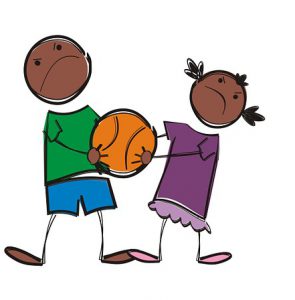 Arguments between siblings are inevitable. The question many parents face, is how to best handle the situation?
Arguments between siblings are inevitable. The question many parents face, is how to best handle the situation?
I’m sharing one recent instance that unfolded in my own house in hopes of helping some of you in search of that very answer — also to show you that it can be done in a way that respects both parties and sets a foundation for growth in all involved:
Last night, we had our most violent sibling-on-sibling encounter yet. I’m sure many of you reading this can relate to that mama/papa bear instinct when you see one of your babies being hurt, even when it’s by one of your other babies. That instinct to protect our young is so strong that we may sometimes lash out on one of our own children in defense of another.
Well, last night, we were heading up to bed late. Everyone was exhausted. Everyone was dysregulated. We had been out of town for 4 days, and there were many potential triggers in play that I was well aware of. My goal was to get everyone up to bed as quickly and calmly as possible before someone — and then inevitably everyone — fell apart.
My oldest two ran upstairs to brush their teeth while I brought the baby and my husband grabbed our bags. The boys had been bickering back and forth and getting in each other’s space the entire way up the stairs. I had requested that they each give the other some breathing room and focus on keeping themselves in control while we prepare for bed.
As my husband and I began walking upstairs, we heard it. The scream that alerts you that someone is very badly hurt. My second child ran out of the room crying so hard he couldn’t breathe. My husband sat down and wrapped him up in his arms. My son took a deep breath and screamed and screamed. My husband asked him what had happened. He told us that his brother had hurt him.
With my second son securely being comforted in the arms of his daddy, I calmly and quietly walked into the bedroom, and just as calmly and quietly called out to my oldest son. He slowly walked out of the closet with his head down. I asked him what had happened and he said, “Mommy, I got so angry. I forgot to walk away.”
“I see.” I replied. “Your brother seems very hurt and upset. What do you think we should do now?”
He responded that we should go and check on him and see if there was anything he could do to help. However, once he walked up to his brother and asked, my second son screamed “no” at him and told him to go away. My oldest took this hard and ran back into the bedroom clearly upset. I followed him. He angrily told me that he was never doing that again. I explained to him that, while he felt calmer and ready to help, his brother was not yet calm and ready to accept that help.
My husband and I began getting everyone ready for bed. While he was helping my middle son into his pajamas, I looked over to see 4 very dark red, bloody streaks down at least half of his back. It literally took my breath away. Until this point, we had not known the offense or the extent of it. This truly looked like wolverine had attacked him. I had to take a gigantic deep breath and settle down that mama bear within me. I told my husband to look on his back. He looked back at me with eyes wide open.
My oldest son said, “I wonder how he got those marks on his back.”
“Your hands made those marks on his back,” I calmly responded.
He looked down at his hands turning them over and examining them, “I must have really sharp nails.”
“Yes,” I said, “and you have very strong hands.”
He looked at me for a moment. I told him, “It’s a great thing to have very strong hands like yours. But they are to be used for good things, like carrying heavy grocery bags in from the car, or holding heavy doors open so others may walk through. They should not be used to hurt others. The next time you feel so angry, I want you to walk away. When you feel so angry that you want to explode, you can go and scratch the pillow, or the mattress, or pound your fists into the ground. But you cannot hurt someone else.”
“I will try, Mommy,” he said. “It is very hard. But I will try.”
“I know you will,” I told him, “because you are not a bad person. And you are not a mean person. You are a very kind boy with a very loving heart. And because of that, the next time you are so angry, you will remember to walk away.”
I could see the internal thoughts racing across his eyes. I could see his mind doubting, but I could also see his heart believing. And then, his body softened. At that moment, I knew he fully embraced that he is a loving and kind person — that his actions do not define him, that he is in fact capable of self-control…and of fixing things when he makes a mistake.
 So often, whether because of our parental bear inside or because we are responding in the way we think we are supposed to, we yell, blame, and punish in these situations. However, what current brain research tells us is that this does zero good, but actually a great deal of harm.
So often, whether because of our parental bear inside or because we are responding in the way we think we are supposed to, we yell, blame, and punish in these situations. However, what current brain research tells us is that this does zero good, but actually a great deal of harm.
You see, children do not choose these emotions or the reactions to their emotions. They aren’t developmentally capable. And if you question this, I ask you: Have you ever felt so angry that you thought you were going to snap? Or maybe you did. Maybe you punched a hole in the wall or threw something across the room or lashed out in anger screaming profanities or insults at those around you. Looking back, did you choose to feel that angry? Did you choose to lose complete control of yourself? Or did it come upon you like a sudden tidal wave and crash into you before you could realize what was happening?
Children’s brains are far less developed than ours. The prefrontal cortex is not fully developed until the mid-20s! These emotions are not at all conscious on their part and actually are very frightening and overwhelming to children. They need our loving guidance and support in these moments, not an iron fist. When we come down on children in these moments, their brains interpret these emotions as unacceptable and bad.
They then internalize the idea that they, too, are shameful and bad people…and that when they have these feelings — of which they are not in control of and do not know what to do with — that they are not worthy of love. This is the last thing I wanted my son to think of himself. What good was that going to do? I’m not trying to raise a bitter and resentful adult whom feels unworthy. I am working to develop a kind and loving one.
Related: The Attached Family’s “Parenting Without Shame” issue
Is it permissive what I did? Do you wonder, how is he going to learn anything from this without punishment? Looking back on my example, you can see very clearly that I made it known that it is OK to feel angry and that there are appropriate ways for us to express and expel our anger, but I also made it very clear that it is never OK to hurt someone else in the process.
This way, my son was able to internalize the idea that he is indeed a kind and loving person, and he can therefore feel empowered to make a better decision the next time these feelings present themselves. He also is now equipped with tools to assist him in making a better decision next time. He now has other ideas of what he can do with his anger that won’t result in someone being hurt — mentally, emotionally, or physically.
Based upon his responses, both verbal and nonverbal, it’s clear to see that he felt terrible about what he had done. It was not his intent to harm his brother. He received a natural consequence — he felt what is called natural or healthy guilt. This is very different from shame. Have you ever felt very badly about something you had done? That is natural guilt. It is not taught — it is developed through the brain and the conscience. This internal guilt he felt is enough of a consequence for him. It is also going to be the driving force in helping him make better choices in the future. But in order for it to come through, he has to feel my unconditional love and calm presence supporting him through this difficult time.
Before we finished up, I said to my oldest son: “Now that your brother has calmed down, it may be a good time to try and talk to him about it again.”
I could see the hesitation on my son’s face — which could have been that he needed some more time to process what we had talked about, or it could have been nervousness of being rejected again. Either way, I quickly reassured him: “When you are ready. Listen to your body, it will tell you when you are ready to talk with your brother. And I am right here to help you if you need it.”
Sometimes, especially in kids over the age of 5, children need some time and space to process the event as well as their feelings surrounding it. It’s very important that we give them this space and time.
I observed their play throughout this morning. This afternoon, I found an opportunity to approach my oldest and ask him if he had a chance yet to talk with his brother about last night. He told me that he had, though I knew it hadn’t yet come up. I waited. About 5 minutes later, he went to his younger brother and asked if he could see the scratch marks from the night before. Consent was granted, so I helped lift up his shirt. My oldest son commented on how they were healing but the fact that they were still there.
The two of them then launched into an entire recount of the event ending with my oldest son saying, while making a scratching motion, “And I did this and that was not OK.”
His younger brother responded with, “Yeah. You hurt me. That was not OK.”
“I’m really sorry,” my oldest son said. It was genuine, and his younger brother knew it.
That was the end of it. Off they ran to play. All fear, anger, and sadness lifted; the relationship renewed and restored; and both kids with a bigger heart and deeper connection than what existed the previous day.


